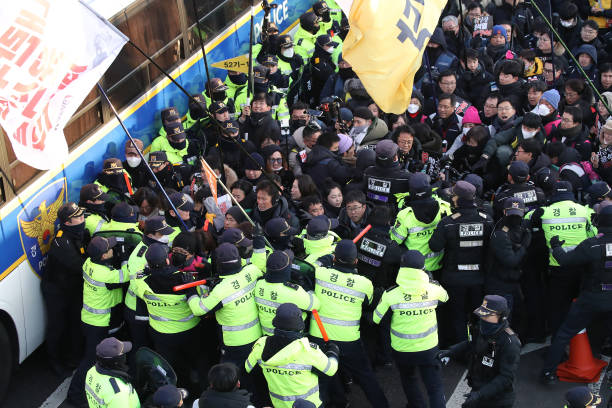South Korea’s political scene plunged into unprecedented territory on Friday when authorities attempted, but failed, to execute an arrest warrant for President Yoon Suk Yeol.
The warrant was issued over Yoon’s controversial declaration of martial law, which was annulled after just six hours. Investigators, accompanied by thousands of police officers, arrived at Yoon’s residence but were thwarted by his security detail and a crowd of loyal supporters forming a human barricade.
Yoon, suspended from duty following his impeachment last month, could become South Korea’s first sitting president to be arrested. His charges include insurrection, one of the few offenses exempt from presidential immunity.
His lawyers condemned the warrant as illegal, questioning the authority of the Corruption Investigation Office for high-ranking officials to lead the case. The warrant remains valid until Monday, leaving room for further attempts at execution.
The situation has stoked deep divisions in South Korea. Thousands of Yoon’s supporters, some brandishing American flags, have gathered outside his residence to protest the warrant.

Political tensions rise as supporters rally to shield President Yoon from legal proceedings.
Yoon has consistently portrayed himself as a defender of democracy against “anti-state forces” that he claims to sympathize with North Korea. Despite his efforts to galvanize support, public opinion has largely soured. A recent Gallup Korea poll placed his approval rating at a dismal 11%.
Opposition parties, particularly the Democratic Party, have criticized Yoon’s rhetoric, accusing him of inciting disorder among his followers.
They’ve urged acting President Choi Sang-mok to ensure Yoon’s arrest, emphasizing the need for the rule of law to prevail. Meanwhile, Yoon has defied multiple summonses for questioning, maintaining that his martial law declaration was within his presidential powers.
This crisis comes at a time of significant economic and geopolitical challenges for South Korea.
Moreover, with the Constitutional Court’s decision on Yoon’s impeachment pending, the nation faces an uncertain political future. Should the court uphold the impeachment, a presidential by-election will follow, potentially reshaping the political landscape of one of Asia’s most vibrant democracies.
